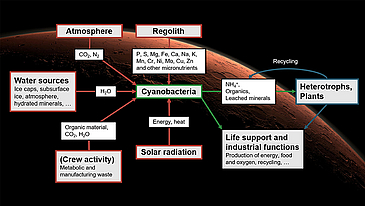CyprienVerseux, Christiane Heinicke, Tiago P. Ramalho, Jonathan Determann, Malte Duckhorn, Michael Smagin, Marc Avila
Frontiers in microbiology12 (2021)
The leading space agencies aim for crewed missions to Mars in the coming decades. Among the associated challenges is the need to provide astronauts with life-support consumables and, for a Mars exploration program to be sustainable, most of those consumables should be generated on site. Research is being done to achieve this using cyanobacteria: fed from Mars's regolith and atmosphere, they would serve as a basis for biological life-support systems that rely on local materials. Efficiency will largely depend on cyanobacteria's behavior under artificial atmospheres: a compromise is needed between conditions that would be desirable from a purely engineering and logistical standpoint (by being close to conditions found on the Martian surface) and conditions that optimize cyanobacterial productivity. To help identify this compromise, we developed a low-pressure photobioreactor, dubbed Atmos, that can provide tightly regulated atmospheric conditions to nine cultivation chambers. We used it to study the effects of a 96% N2, 4% CO2 gas mixture at a total pressure of 100 hPa on Anabaena sp. PCC 7938. We showed that those atmospheric conditions (referred to as MDA-1) can support the vigorous autotrophic, diazotrophic growth of cyanobacteria. We found that MDA-1 did not prevent Anabaena sp. from using an analog of Martian regolith (MGS-1) as a nutrient source. Finally, we demonstrated that cyanobacterial biomass grown under MDA-1 could be used for feeding secondary consumers (here, the heterotrophic bacterium E. coli W). Taken as a whole, our results suggest that a mixture of gases extracted from the Martian atmosphere, brought to approximately one tenth of Earth's pressure at sea level, would be suitable for photobioreactor modules of cyanobacterium-based life-support systems. This finding could greatly enhance the viability of such systems on Mars.
© 2021 Verseux, Heinicke, Ramalho, Determann, Duckhorn, Smagin and Avila. This is an open-access article distributed under the terms of the Creative Commons Attribution License (CC BY)

